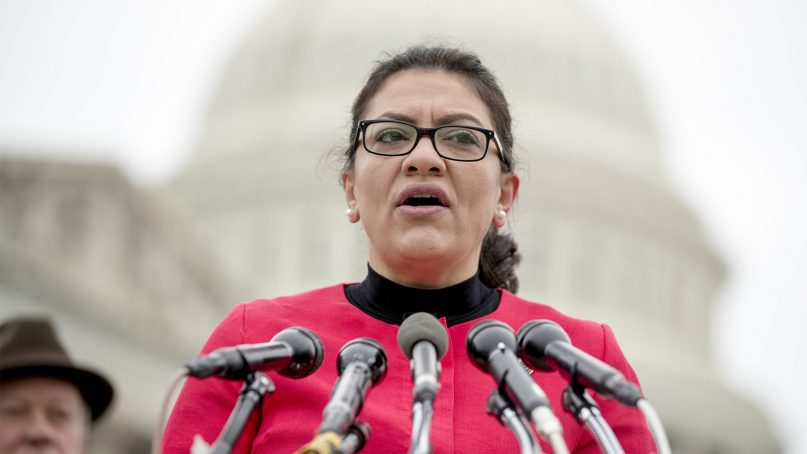Dear Rep. Tlaib:
Is it possible that we misunderstood your recent statement about Israel?
I am referring to your statement about Holocaust Remembrance Day in Israel.
There’s always kind of a calming feeling when I think of the tragedy of the Holocaust, that it was my ancestors — Palestinians — who lost their land and some lost their lives, their livelihood, their human dignity, their existence, in many ways, has been wiped out … in the name of trying to create a safe haven for Jews, post-Holocaust, post-tragedy and the horrific persecution of Jews across the world at that time. And I love the fact that it was my ancestors that provided that in many ways.
Let me state, from the outset, that I have often disagreed with your anti-Israel statements, and your association with the BDS movement.
And, yes: your recent statement is filled with historical distortions.
We both know that, in the main, the Arab residents of mandatory Palestine hardly welcomed Jewish immigration to the land.
Those years of immigration were filled with anti-Jewish violence, as well as Arab support for Nazism and its genocidal policies.
I read your statement, and I wonder two things.
First, I wonder: were you drawing on a different narrative about the relationship between Jews and Palestinians?
A narrative that is no less true than the ugly one?
I am referring to historian Hillel Cohen’s view of our tortured, complex, and nuanced relationship — that there were many Palestinians who welcomed Jewish settlement in the land, and who willingly sold land to Jews. Some Arabs were even disappointed when Jews did not purchase land from them, because they saw the ready economic advantages.
I am referring to the reminiscences of Ya’akov Yehoshua, the father of Israeli literary figure A. B. Yehoshua: “The residential courtyards of the Jews and Muslims were common. We were like one family, we were all friends. Our mothers poured out their hearts to Muslim women and they poured out their hearts to our mothers. The Muslim women accustomed themselves to speaking the Ladino [Sephardic Jewish] language. They frequently used that language’s proverbs and idioms.”
For let us remember together: many of our ancestors were always in the land, or had been there for centuries. Zionism is not entirely dependent on Jewish refugees from persecution. It is a vision for Jewish wholeness.
Second, I wonder: are you seeking some kind of bridge of shalom/salaam with the Jews?
Because there is another way to read your controversial statement.
You might have been saying:
The great painful historical irony is that your redemption from suffering resulted in our suffering. The reasons for our suffering are many, and complex.
- Some of my people fled because they were afraid of the Jewish armies in 1948.
- Some of my people fled because Arab leaders told them to, in anticipation of a bloodbath of the Jews — and in some places, the Jews begged the Arabs to stay.
- Some of my people did not flee, but were expelled by Jewish forces.
Perhaps this might be the “real” statement that you might want to make:
But in the interests of peace/shalom/salaam, I am going to imagine that you were trying to say something like this:
History has been very cruel to the Jews. The pogroms of the 1800s and early 1900s sent many Jews looking for refuge. Many of them came to the land. Many others fled from the anti-Jewish violence in Arab lands.
This historical cruelty culminated in “the tragedy of the Holocaust,” which was horrible — on every imaginable level.
Jewish immigration to the land increased. In the process, “my ancestors — Palestinians — lost their land and some lost their lives, their livelihood, their human dignity, their existence, in many ways, has been wiped out … in the name of trying to create a safe haven for Jews, post-Holocaust, post-tragedy and the horrific persecution of Jews across the world at that time.”
I know, I know: if there is one thing that Jews have, and that this Jew has in abundance, it is chutzpah.
Imagine if we could move beyond our inherited traumas, and seek ways to live together — ideally, in two states.Two states — that will guarantee each other security, safety, and dignity.If that is, indeed, what you were trying to say: issue a clarifying statement.Many American Jews would applaud it.We have a lot of work to do.Let’s stop getting in each other’s way.I might be your critic, but I need not be your enemy.






